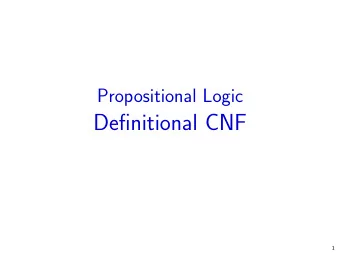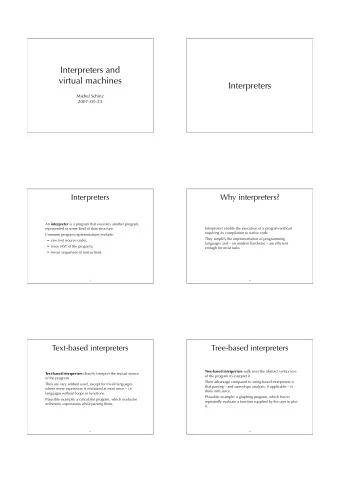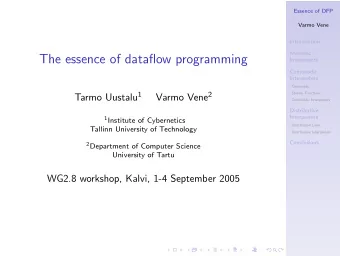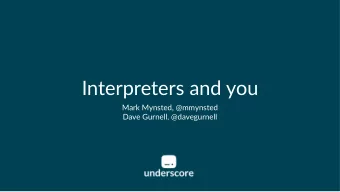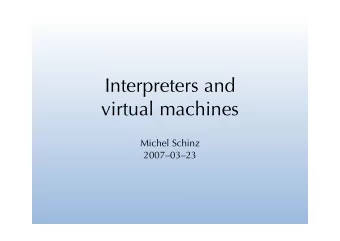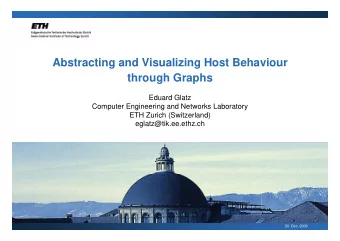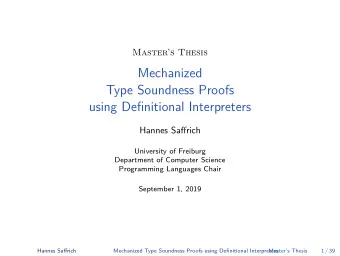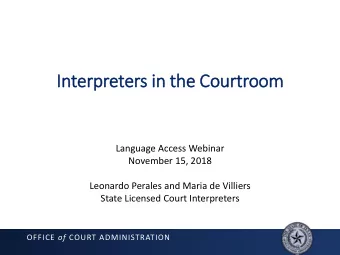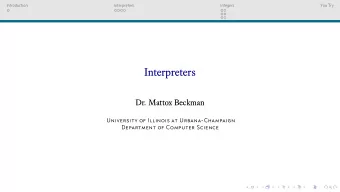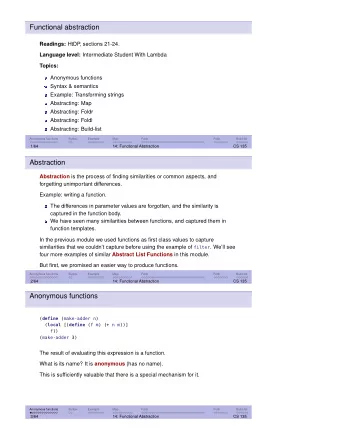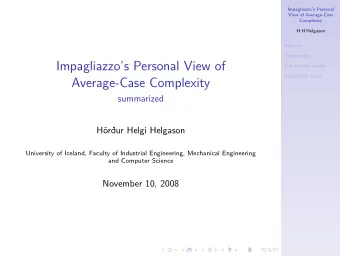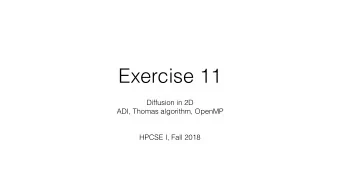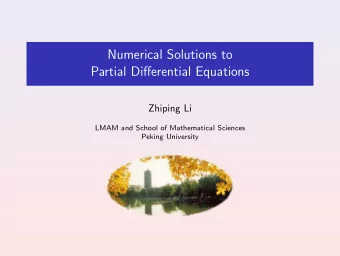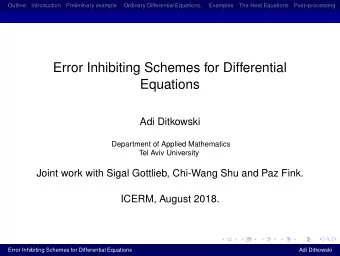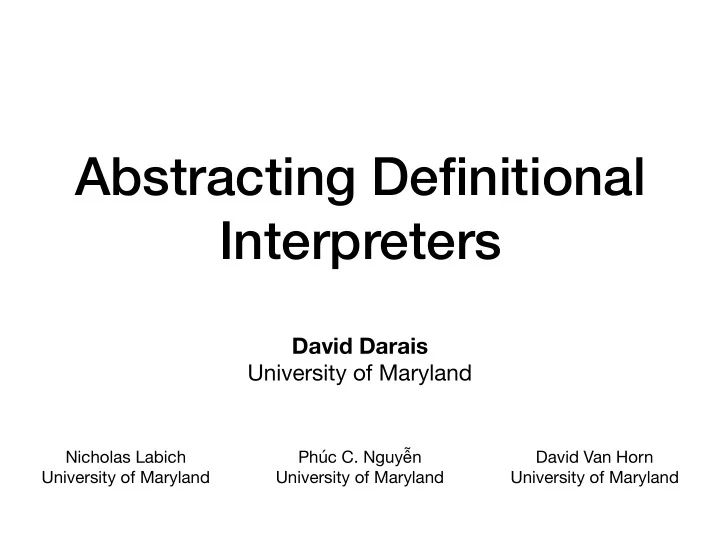
Abstracting Definitional Interpreters David Darais University of - PowerPoint PPT Presentation
Abstracting Definitional Interpreters David Darais University of Maryland Nicholas Labich Phc C. Nguy n David Van Horn University of Maryland University of Maryland University of Maryland Does my program cause a runtime error? Does my
Abstracting Definitional Interpreters David Darais University of Maryland Nicholas Labich Phúc C. Nguy ễ n David Van Horn University of Maryland University of Maryland University of Maryland
Does my program cause a runtime error? Does my program allocate too much? Does my program sanitize all untrusted inputs? Is this proof object computationally relevant?
☹ My PL Doesn’t Have a Program Analyzer
🤕 Should I Write My Own Program Analyzer?
😋 Writing Your Own Program Analyzer is Easy If you know how to write an interpreter
Abstracting Definitional Interpreters Interpreter => Analyzer Sound Terminating Precise Extensible
Context: Abstracting Abstract Machines (AAM) : [ICFP ’10] Sound + Terminating + Easy Based on low-level Abstract Machines
Context: Abstracting Abstract Machines (AAM) : [ICFP ’10] Sound + Terminating + Easy Based on low-level Abstract Machines This Paper: Abstracting Definitional Interpreters (ADI) : [ICFP ‘17] Sound + Terminating + Extra Precision + Even Easier Based on high-level Definitional Interpreters
Inheriting Precision Reynolds - Inheriting properties from defining language [1972] This work - Inherit analysis precision from the metalanguage Result - pushdown analysis Many papers on pushdown precision; we get it for free
Key Challenges Soundness: AAM: A single (parameterized) machine recovers both concrete and abstract semantics ADI: A single (parameterized) interpreter recovers both concrete and abstract semantics
Key Challenges Soundness: AAM: A single (parameterized) machine recovers both concrete and abstract semantics ADI: A single (parameterized) interpreter recovers both concrete and abstract semantics Termination: AAM: Iterating a transition system with finite state space ADI: Caching fixpoint algorithm for unfixed interpreters
Concrete Interpreter Partial Abstract Interpreter Total Abstract Interpreter
Concrete Interpreter 1. Store-allocation style for argument binding 2. Monadic environment and state 3. Parameters for primitive operators and allocation 4. “Unfixed” style
; m is monad ; m is monad-reader[env] env ≔ var ↦ addr ; m is monad-state[store] store ≔ addr ↦ val ; ev : exp → m(val) ( define (ev e) ( match e [( num n) ( return n)] [( vbl x) ( do ρ ← ask-env ( find (lookup x ρ )))] [( if0 e ₁ e ₂ e ₃ ) ( do v ← (ev e ₁ ) z? ← ( zero? v) (ev ( if z? e ₂ e ₃ )))] [( op2 o e ₁ e ₂ ) ( do v ₁ ← (ev e ₁ ) v ₂ ← (ev e ₂ ) ( δ o v ₁ v ₂ )) [( lam x e) ( do ρ ← ask-env ( return ( cons ( lam x e) ρ ))) [( app e ₁ e ₂ ) ( do ( cons ( lam x e ′ ) ρ′ ) ← (ev e ₁ ) v ₂ ← (ev e ₂ ) a ← ( alloc x) ( ext a v ₂ ) ( local-env (update x a ρ′ ) (ev e ′ )))]))
; m is monad ; m is monad-reader[env] env ≔ var ↦ addr ; m is monad-state[store] store ≔ addr ↦ val ; ev : exp → m(val) ( define (ev e) ( match e [( num n) ( return n)] [( vbl x) ( do ρ ← ask-env ( find (lookup x ρ )))] [( if0 e ₁ e ₂ e ₃ ) ( do v ← (ev e ₁ ) z? ← ( zero? v) (ev ( if z? e ₂ e ₃ )))] [( op2 o e ₁ e ₂ ) ( do v ₁ ← (ev e ₁ ) v ₂ ← (ev e ₂ ) ( δ o v ₁ v ₂ )) [( lam x e) ( do ρ ← ask-env ( return ( cons ( lam x e) ρ ))) [( app e ₁ e ₂ ) ( do ( cons ( lam x e ′ ) ρ′ ) ← (ev e ₁ ) v ₂ ← (ev e ₂ ) a ← ( alloc x) ( ext a v ₂ ) ( local-env (update x a ρ′ ) (ev e ′ )))]))
; m is monad ; m is monad-reader[env] env ≔ var ↦ addr ; m is monad-state[store] store ≔ addr ↦ val ; ev : exp → m(val) ( define (ev e) ( match e [( num n) ( return n)] [( vbl x) ( do ρ ← ask-env ( find (lookup x ρ )))] [( if0 e ₁ e ₂ e ₃ ) ( do v ← (ev e ₁ ) z? ← ( zero? v) (ev ( if z? e ₂ e ₃ )))] [( op2 o e ₁ e ₂ ) ( do v ₁ ← (ev e ₁ ) v ₂ ← (ev e ₂ ) ( δ o v ₁ v ₂ )) [( lam x e) ( do ρ ← ask-env ( return ( cons ( lam x e) ρ ))) [( app e ₁ e ₂ ) ( do ( cons ( lam x e ′ ) ρ′ ) ← (ev e ₁ ) v ₂ ← (ev e ₂ ) a ← ( alloc x) ( ext a v ₂ ) ( local-env (update x a ρ′ ) (ev e ′ )))]))
; m is monad ; m is monad-reader[env] env ≔ var ↦ addr ; m is monad-state[store] store ≔ addr ↦ val ; ev : exp → m(val) ( define (ev e) ( match e [( num n) ( return n)] [( vbl x) ( do ρ ← ask-env ( find (lookup x ρ )))] [( if0 e ₁ e ₂ e ₃ ) ( do v ← (ev e ₁ ) z? ← ( zero? v) (ev ( if z? e ₂ e ₃ )))] [( op2 o e ₁ e ₂ ) ( do v ₁ ← (ev e ₁ ) v ₂ ← (ev e ₂ ) ( δ o v ₁ v ₂ )) [( lam x e) ( do ρ ← ask-env ( return ( cons ( lam x e) ρ ))) [( app e ₁ e ₂ ) ( do ( cons ( lam x e ′ ) ρ′ ) ← (ev e ₁ ) v ₂ ← (ev e ₂ ) a ← ( alloc x) ( ext a v ₂ ) ( local-env (update x a ρ′ ) (ev e ′ )))]))
; m is monad ; m is monad-reader[env] env ≔ var ↦ addr ; m is monad-state[store] store ≔ addr ↦ val ; ev : (exp → m(val)) → exp → m(val) ( define ((ev ev ′ ) e) ( match e [( num n) ( return n)] [( vbl x) ( do ρ ← ask-env ( find (lookup x ρ )))] [( if0 e ₁ e ₂ e ₃ ) ( do v ← (ev ′ e ₁ ) z? ← ( zero? v) (ev ′ ( if z? e ₂ e ₃ )))] [( op2 o e ₁ e ₂ ) ( do v ₁ ← (ev ′ e ₁ ) v ₂ ← (ev ′ e ₂ ) ( δ o v ₁ v ₂ )) [( lam x e) ( do ρ ← ask-env ( return ( cons ( lam x e) ρ ))) [( app e ₁ e ₂ ) ( do ( cons ( lam x e ′ ) ρ′ ) ← (ev ′ e ₁ ) v ₂ ← (ev ′ e ₂ ) a ← ( alloc x) ( ext a v ₂ ) ( local-env (update x a ρ′ ) (ev ′ e ′ )))]))
Running The Interpreter ; Y : ((a → m(b)) → a → m(b)) → a → m(b) ( define ((Y f) x) ((f (Y f)) x)) ; eval : exp → val × store ( use-monad (ReaderT env (StateT store ID))) ( define (eval e) ( mrun ((Y ev) e))) > (( λ (x) ( λ (y) x)) 4) '((( λ (y) x) . ((x . 0))) . ((0 . 4)))
Running The Interpreter ; Y : ((a → m(b)) → a → m(b)) → a → m(b) ( define ((Y f) x) ((f (Y f)) x)) ; eval : exp → val × store ( use-monad (ReaderT env (StateT store ID))) ( define (eval e) ( mrun ((Y ev) e))) > (( λ (x) ( λ (y) x)) 4) '((( λ (y) x) . ((x . 0))) . ((0 . 4)))
Interpreter Extensions Intercept recursive calls in the interpreter Change monad parameters Change primitive operators and allocation
E.G., A Tracing Analysis ; m is monad ; m is monad-reader[env] ; m is monad-state[store] ; m is monad-writer[config] ; ev-trace : ((exp → m(val)) → exp → m(val)) → (exp → m(val)) → exp → m(val) ( define (((ev-trace ev) ev ′ ) e) ( do ρ ← ask-env σ ← get-store ( tell ( list e ρ σ )) ((ev ev ′ ) e)))
Running the Analysis ; eval : exp → (val × store) × list(config) ( use-monad (ReaderT env (WriterT list (StateT store ID)))) ( define (eval e) ( mrun ((Y (ev-trace ev)) e))) > (* (+ 3 4) 9) '((63 . ()) ((* (+ 3 4) 9) () ()) ((+ 3 4) () ()) (3 () ()) (4 () ()) (9 () ()))
Running the Analysis ; eval : exp → (val × store) × list(config) ( use-monad (ReaderT env (WriterT list (StateT store ID)))) ( define (eval e) ( mrun ((Y (ev-trace ev)) e))) > (* (+ 3 4) 9) '((63 . ()) ((* (+ 3 4) 9) () ()) ((+ 3 4) () ()) (3 () ()) (4 () ()) (9 () ()))
Concrete Interpreter Partial Abstract Interpreter Total Abstract Interpreter
Partial Abstract Interpreter 1. Abstracting Primitive Operations 2. Abstracting Allocation The Game: "Abstract" = finite
Abstracting Numbers ; m is monad-failure ; m is monad-nondeterminism ; num ≔ ℤ ⊎ {'N} ; δ : op num num → m(num) ( define ( δ o n ₁ n ₂ ) ( match o ['+ ( return 'N)] ['/ ( do z? ← (zero? n ₂ ) ( if z? fail ( return 'N)))])) ; zero? : num → m(bool) ( define (zero? v) ( match v ['N ( mplus ( return #t) ( return #f))] [_ ( return (= v 0))]))
Abstracting Numbers ; m is monad-failure ; m is monad-nondeterminism ; num ≔ ℤ ⊎ {'N} ; δ : op num num → m(num) ( define ( δ o n ₁ n ₂ ) ( match o ['+ ( return 'N)] ['/ ( do z? ← (zero? n ₂ ) ( if z? fail ( return 'N)))])) ; zero? : num → m(bool) ( define (zero? v) ( match v ['N ( mplus ( return #t) ( return #f))] [_ ( return (= v 0))]))
Abstracting Addresses ; alloc : var → m(addr) ( define (alloc x) ( return x)) ; ext : addr × val → m(unit) ( define (ext a v) ( do σ ← get-store ( put-store (union σ ( dict a ( set v)))))
Abstracting Addresses ; alloc : var → m(addr) ( define (alloc x) ( return x)) ; ext : addr × val → m(unit) ( define (ext a v) ( do σ ← get-store ( put-store (union σ ( dict a ( set v)))))
Running the Analysis ; eval : exp → ℘ (option(val) × store) ( use-monad (ReaderT env (FailT (StateT store (NondetT ID)))) ( define (eval e) ( mrun ((Y ev) e))) > ( let ((f ( λ (x) x))) (f 1) (f 2)) '( set 1 2) > ( letrec ((loop ( λ (x) (loop x)))) (loop 1)) TIMEOUT
Running the Analysis ; eval : exp → ℘ (option(val) × store) ( use-monad (ReaderT env (FailT (StateT store (NondetT ID)))) ( define (eval e) ( mrun ((Y ev) e))) > ( let ((f ( λ (x) x))) (f 1) (f 2)) '( set 1 2) > ( letrec ((loop ( λ (x) (loop x)))) (loop 1)) TIMEOUT
Recommend
More recommend
Explore More Topics
Stay informed with curated content and fresh updates.
